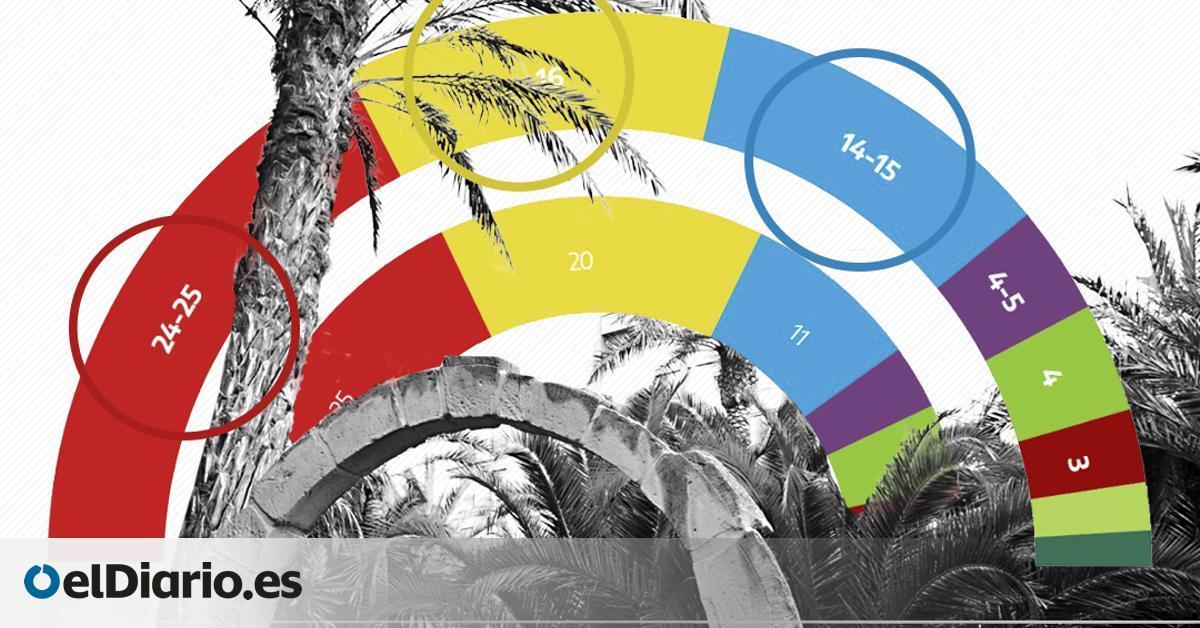
The left-wing parties that make up the Pacto del Botànic, PSPV, Compromís and Unides Podem-Esquerra Unida, will once again obtain electoral victory on May 28 in the Valencian Community. The alliance would revalidate a third term in elections that would be settled by a narrow margin, with a distribution of blocks very similar to the current one, although there are big changes in the block on the right because the PP becomes the force with the most votes and Ciudadanos it remains outside the Corts Valencianes.
The Valencian Community revalidates its leadership for another year by obtaining 153 Blue Flags
Further
According to the survey carried out by Simple Lógica for elDiario.es, the sum of the left has between 50 and 52 deputies in a parliament with 99 seats in total in which the absolute majority is 50 seats, while the right formed by PP and Vox it fluctuates between 47 and 49. In all the projected scenarios, the left-wing bloc exceeds the right-wing bloc, and although the latter rises two seats from its current situation, it would not obtain sufficient parliamentary support to govern.
Ciudadanos, which obtained 18 deputies in 2019, is absorbed by PP and Vox and falls below the 5% required to have representation, while the votes that Unides Podem loses would go to the PSPV and Compromís. Ximo Puig’s Socialists get 25.3% of the support – in 2019 they achieved 23.9% – and would add between one and two seats to their current result, reaching 29 parliamentarians.
Unides Podem-Esquerra Unida, the formation headed by Héctor Illueca, would go from its current 8 deputies to obtain 5 representatives and Compromís, now headed by Joan Baldoví, would keep its current 17 seats and could even add one deputy. The purples have a support percentage of 6.7% compared to the 8% they achieved in 2019; Valencianists 18.3% compared to 16.4% in 2019.
The PP will be the force with the most votes, with 28.4% of support, but it will not be able to govern with Vox, which would be supported by 14.5% of those consulted. The popular ones of Carlos Mazón rise almost 10% compared to the results of the regional elections and add up to 13 seats, while Ciudadanos, which obtained 18 seats, would be left out of the Corts Valencianes, with a result that barely exceeds 3.6 % of the total. The far-right Vox party would go from 10 deputies to 15 or 16.
By constituencies, the right would win for a deputy in Alicante, it would tie in Castellón with 12 seats in each block and the Valencia constituency, where there is a greater dispute over seats, would give victory to the left with between 21 and 23 deputies against 18 or 19 that could obtain the sum of PP and Vox.
Puig and Baldoví, the best known and valued
The best-known candidates are Ximo Puig and Joan Baldoví, who far outnumber opposition leader Carlos Mazón. The president of the Generalitat and PSPV candidate obtains 90% awareness, followed by the Compromís candidate, 71.3%. The representative of the PP is known by only 56% of those surveyed, while Carlos Flores, from Vox, is known by 26%. Héctor Illueca, candidate of Unides Podem, has a public awareness of 36% in the survey.
In the evaluation of candidates, the left bloc is also victorious. The president of the Generalitat Valenciana and socialist candidate receives an approval of 52.4% and a disapproval of 38.4%. He obtains an average rating of 5.6 out of 10. The head of the Compromís list, Joan Baldoví, is approved by 39.5% and disapproved by 31.8%, with an average grade of 5.8. The PP candidate, Carlos Mazón is approved by 18% and disapproved by 38.%%, with an average of 4.4. The second vice president of the Generalitat and candidate of Unides Podem, Héctor Illueca, is approved by 11.3% and disapproved by 38.5%, with a rating of 4.7. And the leader of Vox, Carlos Flores, is approved by 7.9%, disapproved by 18.3%, and achieves a grade of 4.2, although 73% of those surveyed do not know who he is.
Source: www.eldiario.es

